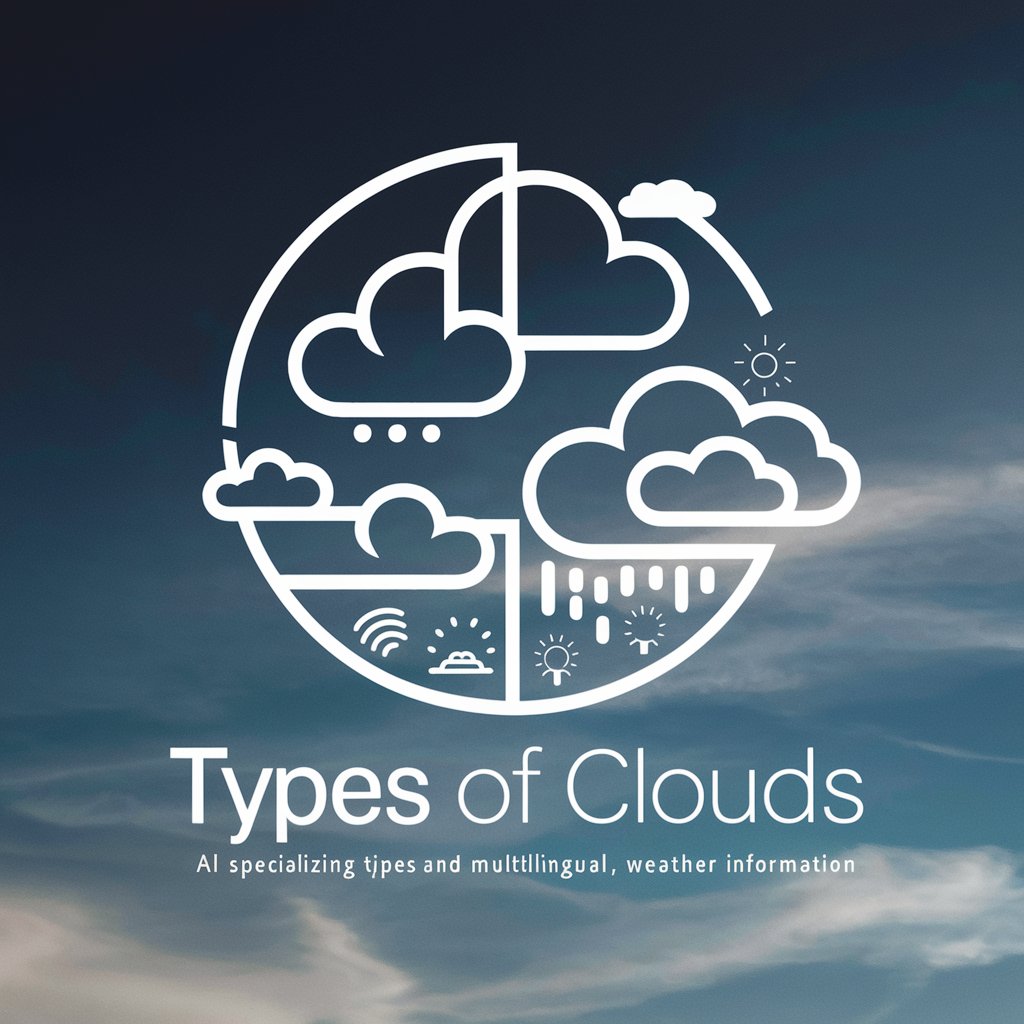
☁️ Cloud Formation Classifier 🌪️ - Cloud Type Identification

Decipher the sky with AI-powered cloud classification.
Help
Daily Briefing
I Want My Own GPT!
Feedback
Classify this cloud formation for me.
What weather should I expect with these types of clouds?
Explain the science behind cloud formation.
Get Embed Code
Introduction to Cloud Formation Classifier
The Cloud Formation Classifier GPT is an AI tool designed to analyze cloud formations and atmospheric conditions to identify different cloud types and predict upcoming weather patterns. It leverages image recognition and data analysis to assess cloud formations in user-uploaded images, classifying them into categories such as cirrus, cumulus, stratus, and nimbostratus, among others. This tool is built to provide users with an understanding of what certain cloud formations indicate about the weather, using real-time data, historical weather patterns, and current atmospheric conditions. It serves as an educational and predictive platform for those interested in meteorology, offering insights into cloud science and the implications of various weather conditions on the environment and human activities. Powered by ChatGPT-4o。

Main Functions of Cloud Formation Classifier
Cloud Type Identification
Example
Analyzing an image of the sky and identifying the presence of cumulus clouds, which are often associated with fair weather but can develop into storm clouds under certain conditions.
Scenario
A user uploads a photo of the sky from their backyard. The Cloud Formation Classifier analyzes the image, identifies cumulus clouds, and predicts potential weather changes.
Weather Prediction
Example
Using the classification of clouds in an image to predict possible rain or storm conditions in the area.
Scenario
After classifying clouds in an uploaded image as nimbostratus, the tool predicts an imminent rain, helping users plan their day accordingly.
Educational Insights
Example
Providing detailed explanations about different cloud types and their meteorological significance.
Scenario
A student uses the tool to learn about cloud formations for a school project, receiving detailed information on cloud types and weather patterns.
Ideal Users of Cloud Formation Classifier
Meteorology Enthusiasts
Individuals with a keen interest in weather patterns and cloud formations, seeking to deepen their understanding or satisfy their curiosity about meteorological phenomena.
Educators and Students
Teachers and students looking for an interactive and informative way to learn about or teach meteorology, cloud science, and weather prediction.
Outdoor Planners and Enthusiasts
Event planners, farmers, hikers, and anyone who relies on weather predictions to plan activities, benefiting from accurate weather forecasts based on cloud analysis.

How to Use the Cloud Formation Classifier
1
Start by accessing a free trial at yeschat.ai, no sign-up or ChatGPT Plus subscription required.
2
Upload an image of the sky showcasing cloud formations directly through the interface.
3
Wait for the AI to analyze the image and classify the cloud formations based on type.
4
Review the detailed report provided by the AI, which includes cloud types and weather prediction.
5
Utilize the additional resources offered for learning about cloud science and meteorology for a comprehensive understanding.
Try other advanced and practical GPTs
🐞 BugScope Explorer 🦋
Discover the insect world with AI

🏺 Ancient Relic ID Master 🕵️♂️
Unlock history with AI-powered artifact analysis

🌌✨ Celestial Guide & Identifier 🪐🔭
Explore the cosmos with AI-powered guidance.

🌍✂️ Cultural Couture Identifier
Unveiling Cultural Attires with AI

🌍 Geo-Rock Wizard Expert 🪨
Unveiling Earth's Secrets with AI

🌍✈️ Polyglot Sign Reader 🛣️🔍
Translate signs instantly, powered by AI

🏛️ Architectural Style Sleuth 🕵️♂️
Unlock architectural secrets with AI

🎨 Urban Art Analyzer GPT 🕵️
AI-powered urban art exploration.

✍️ Scribe Sensei Transcriber 📜
Transforming handwriting to digital text with AI

🔍✨ DermHelper: Skin Expert AI 🧴🩺
Empowering skin health with AI

🚗 Auto-Identify Master GPT 🕵️
AI-powered car recognition at your fingertips.

🎨🔍 Authentic Art Sleuth AI
AI-powered Art Authenticity Insights

FAQs about the Cloud Formation Classifier
What types of clouds can the Cloud Formation Classifier identify?
The classifier can identify various cloud types including cirrus, cumulus, stratus, and nimbostratus, among others, using image recognition technology.
How accurate are the weather predictions made by the Cloud Formation Classifier?
Weather predictions are highly accurate, leveraging real-time data, historical weather patterns, and current atmospheric conditions.
Can the Cloud Formation Classifier help with academic research?
Yes, it is an invaluable tool for academic research in meteorology, providing detailed analysis of cloud formations and weather patterns.
Is the Cloud Formation Classifier suitable for professional meteorologists?
Absolutely, professional meteorologists can use it to enhance their weather forecasts and research with its advanced cloud classification and weather prediction capabilities.
How can hobbyists make the most out of the Cloud Formation Classifier?
Hobbyists can enrich their knowledge of meteorology and cloud science through the tool's detailed analyses and educational resources.





